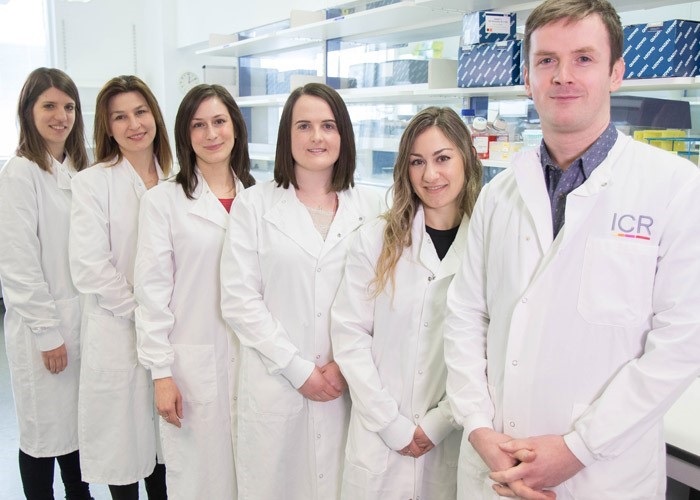Scientists largely funded by Breast Cancer Now have discovered three new genetic changes that increase the risk of breast cancer in men, furthering our understanding of this form of the disease.
Scientists largely funded by Breast Cancer Now have discovered three new genetic changes that increase the risk of breast cancer in men, furthering our understanding of this form of the disease.

Understanding the genetics of male breast cancer
Scientists have found three new common changes in DNA that can increase a man’s chance of developing breast cancer.
The research, largely funded by Breast Cancer Now, brings the total number of known common genetic changes linked to male breast cancer to five.
Researchers also observed that the disease has a similar genetic basis in men and women. In future, these findings could help identify men who are at higher risk of developing breast cancer and lead to new preventive treatments for men and women.
How breast cancer affects men
Breast cancer in men is very rare, but around 370 men are diagnosed with the disease every year in the UK, and around 80 men die.
Men with a strong family history of breast cancer among female relatives are known to be at greater risk of the disease. Around 10% of cases in men are caused by changes in the BRCA2 gene.
However, the exact causes of the disease in men are not well understood and there is great debate around whether breast cancers in men and in women are different.
Dr Simon Vincent, Director of Research, Services and Influencing at Breast Cancer Now, explained the importance of this research:
‘This study, which shows more of a similarity between the genetic causes of the disease in men and women than previously thought, is a major step forward. Our knowledge of breast cancer in men is limited, because male breast cancer is rare which makes it difficult to collect enough tissue or blood samples to research and understand the disease.’
Looking for the genetic changes
The study involved 1,380 men with breast cancer, primarily from the Breast Cancer Now Male Breast Cancer Study.
The team of scientists from The Institute of Cancer Research (ICR), London, and Queen’s University Belfast found three genetic changes that increased the risk of developing breast cancer in men by approximately 47%, 45% and 61% respectively.
All three changes are also known to affect the risk of the disease in women, so researchers then analysed whether male and female breast cancer has similar genetic causes. They found that there was a significant overlap in genetic risk factors for breast cancer in men and women.
Dr Nick Orr, who led the research, explained these findings:
‘There has been much debate about whether breast cancers in women and men are distinct from one another. Our study has shown, for the first time, that the genetic factors influencing susceptibility to male breast cancer and the most common type of female breast cancer are much more alike than they are different.’
The study also found that men at the highest genetic risk were almost four times more likely to develop breast cancer than those at lowest risk. This is based on the results from a DNA test that was designed to assess the risk in women.
Understanding the results
‘Our findings suggest that the underlying biology that affects how breast cancer develops and grows is probably similar in men and women,’ said Nick. ‘This means that advances in prevention and treatment for the disease may be of benefit to all patients, irrespective of their gender.’
Further research is now needed to understand how these findings could help develop more precise risk testing for men who carry genetic changes such as the BRCA2 mutation. This could help doctors guide any decisions around potential risk-reducing steps.
‘We now look forward to further research into the shared genetic causes of male breast cancer which could lead to developing risk-reducing treatments and interventions to help prevent more cases among those at increased risk in the future,’ added Simon.
If you have any concerns about breast cancer, you can speak to our expert nurses on our free Helpline at 0808 800 6000 or by using our confidential Ask Our Nurses service.
The study is published in Journal of the National Cancer Institute.
Breast Cancer Now thanks our supporters of 23 years, grant-making breast cancer charity Walk the Walk for its generous grant in the initial stages of the Breast Cancer Now Male Breast Cancer Study.
Find out more about our current research projects.